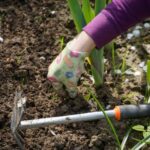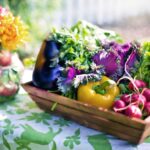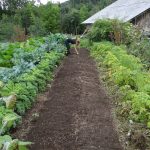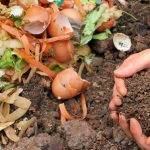Composting is a simple, inexpensive, and environmentally friendly way to manage the waste from your home and garden. If you compost at home, you will have free, nutrient-dense compost that you can use all around your garden. In this article, we will cover composting, how to do it, and what you will need to make your own.
Contents
What is composting?
Composting is a natural way to turn organic waste like leaves and food scraps into a valuable fertiliser that can increase the nutrients in soil, leading to better plant growth. Composting speeds up the decomposition process by providing the perfect environment for bacteria, fungi, and other decomposers to live. Compost is the decomposed matter that is left behind when the process is complete.
What are the benefits of composting?
- You will save money on the cost of purchasing compost
- Cut down on plastic packaging that would otherwise be sent to landfills
- Reduce the use of peat, which is a beneficial natural resource that is rapidly disappearing
- It gives worms and other insects a place to live, but it also gives hedgehogs and other small animals food
- It improves the soil quality, feeds the plants essential nutrients, and also helps prevent diseases
What can I compost?
It’s easy to make compost. You should try to get a good mix of “green” and “brown” material because this will produce the most nutrients.
Green materials include
- Plant cuttings
- Weeds
- Grass cuttings
- Hedge clippings
- Cut flowers
- Animal manure with straw
- Fruit and vegetable peelings
Brown materials include
- Autumn leaves
- Cardboard
- Egg boxes
- Egg shells
- Paper bags
- Wool
- Straw
- Used kitchen roll
It is essential to keep in mind that you should not put things in your compost bin such as
- Dog faeces
- Cat Litter
- Cooked food
- Bones
- Plastic packaging
- Coal ash
Putting these things in your compost bin will contaminate it and may introduce parasites and attract pests.
Compost bin—do I need one?
No, you do not need a compost bin. As long as the conditions are right, you can start composting without one. All you need is the right environment. The following four components are necessary for a healthy environment for the composting process:
- Air – oxygen, which is needed for aerobic decomposition
- Water – organisms need water to live
- Shelter – protection from the elements
- Heat – the higher the temperature, the higher the rate at which microorganisms will feed and reproduce
How do I know when my compost is ready?
The composting process takes around one year. When it is ready, it should be a dark brown colour, feel slightly moist, have a crumbly consistency, and smell earthy.
Don’t worry if you find eggshell fragments and twigs in your compost; this is completely normal. Larger pieces that need more time to break down can be taken out of the compost and put back in the bin.
Composting methods
Cold composting – this method is achieved by layering brown, carbon-dense materials with equal volumes of green, nitrogen-rich materials over a longer period of time. It is referred to as “cold composting” because the temperatures that are reached inside the compost bin are lower when the components are added gradually.
Hot composting – this method is achieved by adding all of the components to the compost bin at the same time. This method is usually used in larger gardens with more organic materials to compost.
The temperature will rise and fall. When the temperature drops, the contents will need to be turned over to introduce more oxygen, increasing the temperature again. It will need to be turned a few times, but after about 3 months, the compost will be ready. Because the temperatures are always high, this method makes compost much faster than cold composting.
Bokashi bin – A bokashi bin is a great addition to your compost bin as you will be able to compost all of your food scraps, including those from cooked food and meat. Bokashi bran is added to the food scraps to help break them down. After the bokashi bran is added, you can leave it for a few weeks to ferment. Once the process is complete, you can either put the contents into the compost bin or bury them directly in the ground.
Composting for a small garden
A “wormery” is a small container that can house a colony of special worms. This type of wormery is also known as vermiculture and is perfect for those with limited space. The worms used in a wormery are able to digest leftovers from cooked foods as well as small amounts of garden waste. Wormeries produce a small amount of compost and liquid, the combination of which results in a highly concentrated form of plant food.
Purchase the products in this article
Why is composting not a common practice in the UK?
Those of us who grow our own fruits and vegetables recognise the importance of having a home composting system. However, composting at home isn’t really necessary for everyone. There’s probably not much point in making compost if you don’t have a use for it. Not everyone in the UK is actively making compost at home, but they are composting indirectly. All of our food scraps are collected weekly by the local council and turned into compost.
What is the difference between composting and rotting?
Composting is different from rotting in that the material being composted is typically damp rather than drenched in water. Composting is the controlled aerobic breakdown of organic materials, most commonly food scraps and garden waste. Worms, microorganisms, and insects all play a part in the process. Composting also produces heat, which is sufficient to prevent the rotting of organic matter and speed up the decomposition process.
Can you get a free compost bin from the council?
You may not be able to get a free compost bin from the council, but it is worth checking as most councils are offering discounts on compost bins. My local council is offering a 100% recycled 220-liter compost bin for just £10. Alongside the compost bin, they are also offering a free e-learning course to learn all about composting. You may be able to get a free composting bin on your local market place.






